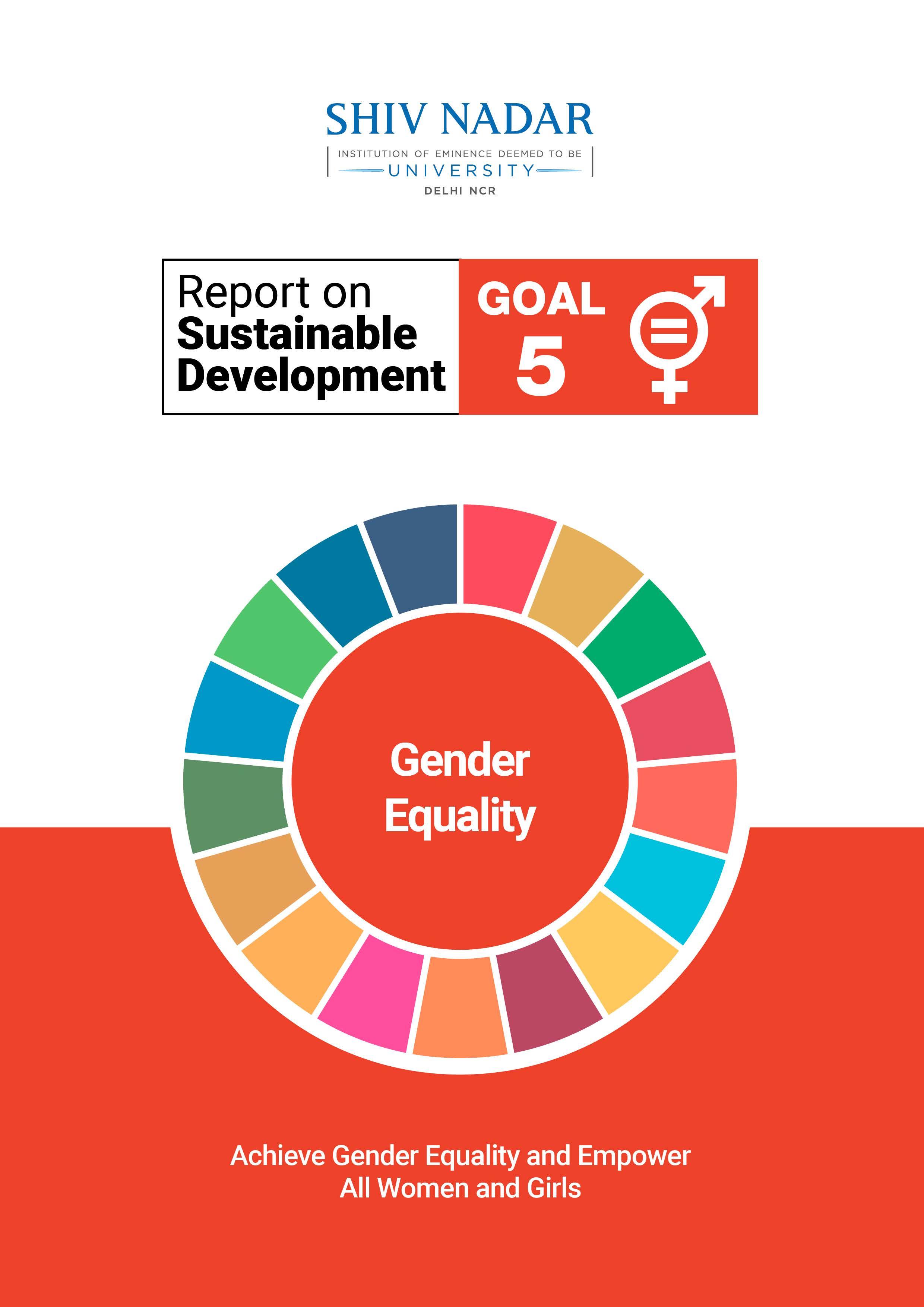

Sustainable Development
Goal 5 has nine targets and 14 indicators and clearly emphasizes ending discrimination, violence, and exploitation against all women.
Despite making up nearly 50% of the global workforce, women represent only 28% of researchers worldwide. This gender gap in research and innovation continues to hinder progress across various fields.
At Shiv Nadar University, the leadership is making a conscious effort to address this disparity. The university fosters a supportive environment for women in research, offering mentorship, resources, and opportunities for collaboration.
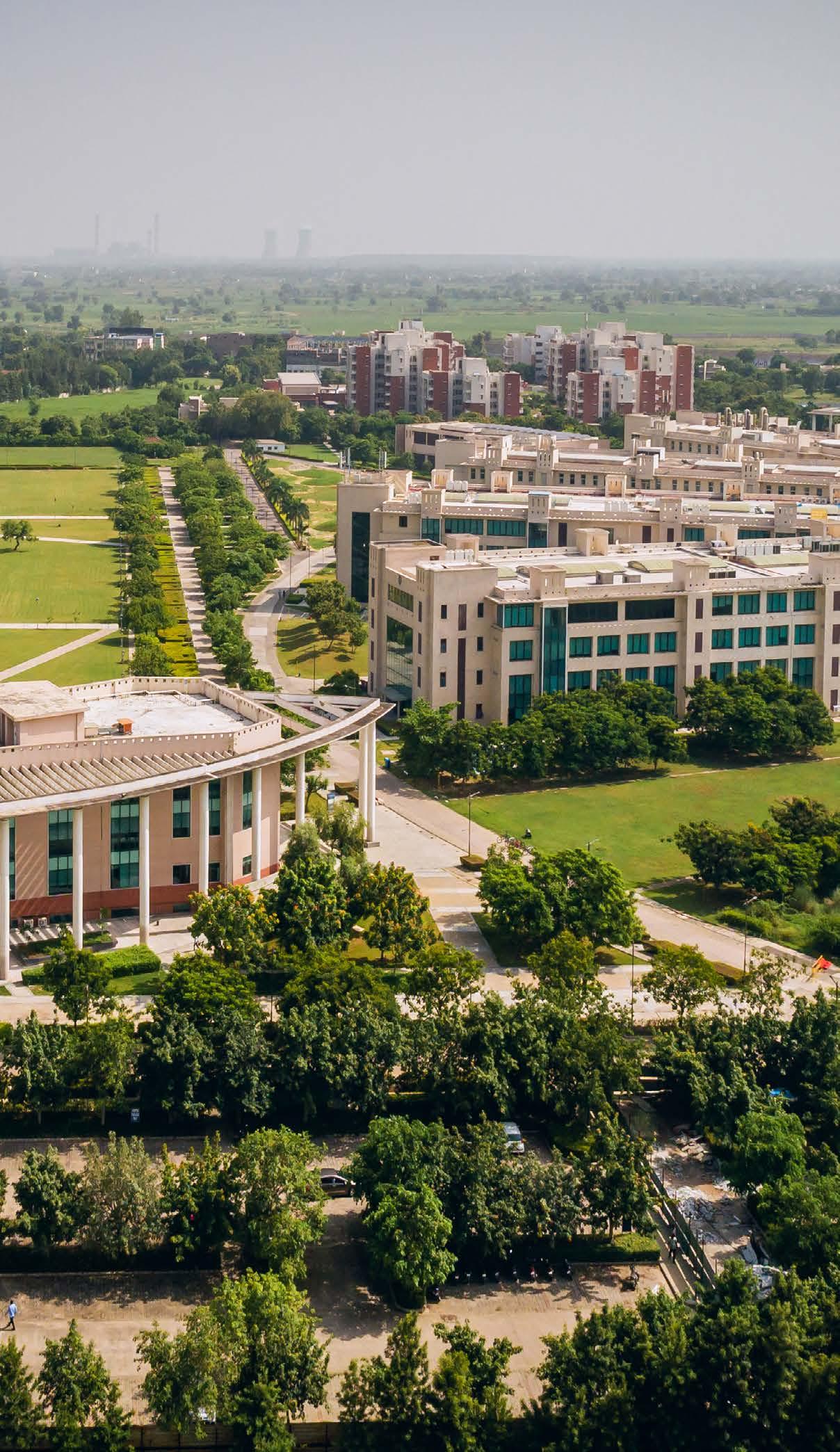
Women face some significant barriers in the field of research. The problem is large, and one solution could be uniting women involved in research to form a global platform to overcome the existing challenges. This issue is a reflection of larger social problems, and they have to be addressed first. Strategies, resources, and support are the need of the hour to devise such solutions.
Dr. Ananya Mukerjee, Vice Chancellor, Shiv Nadar University

TEACHING AND LEARNING
At the School of Humanities and Social Sciences, many departments offer courses for undergraduate and graduate students, such as Introduction to Gender Studies (ENG 304), Gender Studies (ENG 612), Studying Culture, Caste and Gender (SOC 216), Introduction to Gender Systems (SOC 292), Gender in International Relations: Power, Sexuality and Violence (INT 142), Engendering History (HIS 216), Gender and International Relations (INT 266), Contextualizing Gender (SWC 309).
For undergraduate students, many compulsory courses are regularly offered, such as Gender Violence and Social Marketing for Social Change (CCC 215), Environmental Studies (CCC 704), Environmental Impact Assessment (CCC 406), Energy for Sustainable Future (CCC 614), Use of Energy in our Daily Life (CCC 624), to name a few.
We have subscribed to a course “Consent Matters” offered by Oxford University Press.
‘Consent Matters’ is a course undertaken by all our students, faculty, and staff. This online course, developed by Epigeum, part of Oxford University Press, educates on the importance of sexual consent, communication in relationships, and bystander intervention.
To make our students aware of the rights, entitlements, and responsibilities enshrined in the Sexual Harassment at Workplace (Prevention, Prohibition & Redressal) Act 2013 and under the UGC regulations, 2015, we decided to move beyond the lecture mode and converted this to experiential learning by taking this online course across the university and participating in immersive workshops. Conducted by a team of faculty, staff, and students, the workshops bring together fictional skits to tackle real-life issues for students that, in turn, bring home understanding, inclusivity, and sensitivity to the problems.
STUDENT PROJECTS
Health and Menstrual Awareness Session for Housekeeping Staff
On November 12, 2024, the Active Dreams and Gender Champions of Shiv Nadar University Chapters organized a Menstrual Health Session for the housekeeping staff. A gynecologist led the session to raise awareness, dispel myths, and provide vital information on menstrual health, such as understanding the menstrual cycle, debunking taboos, hygiene practices, and addressing health concerns.
Here is a glimpse of our work advancing SDG 5 through our teaching, research, institutional practices, and partnerships.
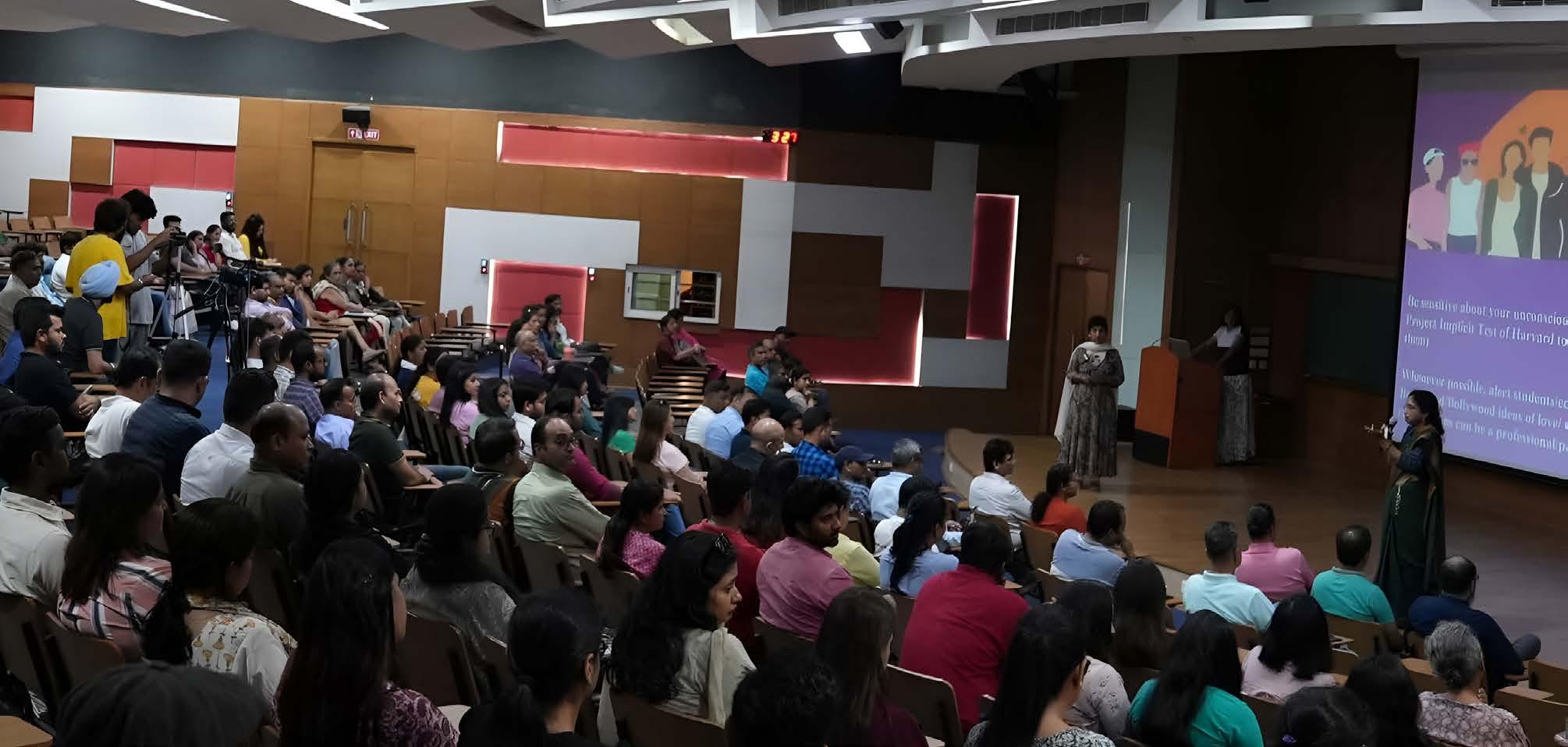

This was followed by a free health checkup. The attendees expressed gratitude and appreciation for the open and judgment-free space. Events like this impart inclusivity, empower participants with knowledge, foster a supportive workplace, break the stigma surrounding menstruation, and promote health education.

Go Green Club – Health and Go Green Club – Health and Sustainable Lifestyle
A sustainability event focused on personal care products was held, raising awareness about the industry’s environmental impact. The event highlighted alternatives like bamboo sanitary napkins and menstrual cups. Around 150 women on campus participated and learnt about the eco-friendly choices and the dangers of chemicals in traditional products. Fun quizzes encouraged a shift towards a more sustainable lifestyle.
The event also partnered with Active Dreams, who provided menstrual health awareness and instructional sessions using menstrual cups, a new and sustainable alternative to sanitary napkins.
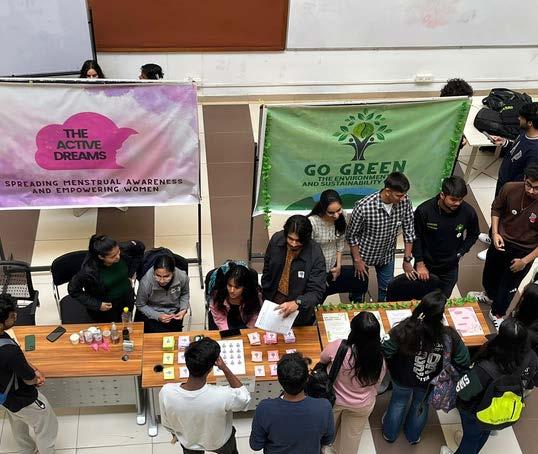
RESEARCH
Persistent
effects of a conditional cash transfer: a case of empowering women through
Kanyashree in India
Launched in 2013 in West Bengal, India, Kanyashree Prakalpa is a conditional cash transfer program incentivizing girls to stay in school and delay marriage. The program provides annual scholarships to 13–18-year-old girls for remaining enrolled in school, and a one time transfer upon attaining adulthood, conditional on remaining unmarried and pursuing education. Using pre- and postprogram data and cohort-specific eligibility rules for 15–35-year-old women and employing doubledifferences and triple-difference frameworks, we find that exposed women experience 7 to 8 percentage points higher likelihood of independent movement outside the home and have a lower tolerance for domestic violence. We see the affected cohort to have a 4 to 5 percentage points lower likelihood of justifying wife-beating by husbands. We find suggestive evidence that these results are mediated by access to bank accounts and increased schooling. This underscores the importance of education and financial independence as a pathway to women’s empowerment. © The Author(s), under exclusive licence to Springer-Verlag GmbH Germany, part of Springer Nature 2024.
Banerjee, Subarna, and Gitanjali Sen. “Persistent effects of a conditional cash transfer: a case of empowering women through Kanyashree in India.” Journal of Population Economics 37, no. 4 (2024): 66.

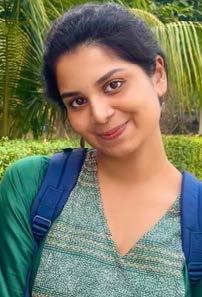
Women’s attitudes towards physical intimate partner violence in India: Trends, patterns, and determinants
Women’s attitudes towards physical intimate partner violence are a major determinant of the likelihood of their exposure to physical intimate partner violence. The study scrutinizes the third, fourth, and fifth rounds of the National Family Health Survey using descriptive analyses and logistic regression models to understand the trends, patterns, and drivers of women’s attitudes towards physical intimate partner violence across various demographic and socioeconomic groups in India. The findings reveal a noticeable decline in the level of women’s acceptability of physical intimate partner violence over the past 15 years, albeit at a slow pace. Furthermore, the study demonstrates that the acceptability of physical intimate partner violence is more prevalent among women from demographically and socioeconomically disadvantaged backgrounds. This includes women who marry at a young age, have no formal education, are exposed to interparental violence, belong to lower caste or tribal communities, exhibit poor wealth status, and reside in rural areas. The findings suggest a need for targeted policy interventions to enhance educational opportunities and promote socioeconomic equity, particularly within demographically and socioeconomically disadvantaged groups.
Shremoyee, Shreemoyee, Punarjit Roychowdhury, and Gaurav Dhamija (2025). Women’s Attitudes Towards Physical Intimate Partner Violence in India: Trends, Patterns, and Determinants. PLOS ONE https://journals.plos.org/plosone/ article?id=10.1371/ journal.pone.0318350
THE UNSAID SEGREGATION: Understanding Exclusion in Classrooms
In an extensive research project funded primarily by the British Council on the theme “Gender and Higher Education in India,” a team of students from the School of Humanities and Social Sciences attempted to interrogate this assumed intentionality that entails accessing and negotiating shared spaces on a campus like ours. With a critical focus on gender and its impact on navigating through space, the team curated an exhibition open for all to view, reflect, and engage with. The exhibits included audio-visual presentations, an interactive map, fun games, and more!
The students were mentored by Dr. Sruthi Muraleedharan, Assistant Professor at the Department of International Relations and Governance Studies (IRGS), and Dr. Divya Kannan, Assistant Professor at the Department of History and Archaeology.
Women Premier League: Is This Just the Start? - The case study
Dr. Bikramjit Rishi, Professor, Shiv Nadar University, Delhi-NCR, School of Management and Entrepreneurship, published a case study with Ivey Publishing. The case study, ‘Women Premier League: Is This Just the Start?’ explores the establishment and growth of the Women’s Premier League, highlighting its role in elevating women’s professional sports.
The WPL has garnered substantial viewership and corporate sponsorship, reflecting a strong market demand. It has become a platform for nurturing young talent, though it faces challenges such as attendance at WPL matches and creating value for its stakeholders. The future outlook includes expansion plans, innovative fan engagement, and a long-term vision of sustainability and inclusivity. The case study points out that while the WPL has made significant early strides, addressing these challenges is essential for its continued success and for paving the way for greater gender equality in sports.
Dr. Bimlesh Lochab, Professor, Department of Chemistry, featured in SHE IS: 75 Women in Chemistry.


On the occasion of the International Day for Women and Girls in Science, Dr. Bimlesh Lochab, a professor of chemistry, was recognized as one of the inspiring trailblazers in her field. She has been featured in the SHE IS: 75 Women in Chemistry, which celebrates the incredible contributions of women scientists making an impact in India. This recognition was showcased in the fourth edition of “She Is”, Beyond Black, in partnership with the Office of the Principal Scientific Adviser to the Government of India and the Royal Society of Chemistry (RSC). The book was inaugurated at IISER Bhopal on February 6, 2025.
No
country for sex workers, then or now: Srijit Mukherji’s Begum Jaan (2017) and its many imaginations
This paper reads the period film Begum Jaan (Mukherji, 2017) for its portrayal of Partition of the Indian subcontinent as an event of gendered and sexual violence. In doing so, it explores the biopolitics of sex work at the historical juncture of 1947. It examines how the birth of nations accompanies the devaluing of women’s lives over their unraped bodies. Focusing on the political and ethical import of the sex workers’ resistance against eviction in the film, it highlights the precarity of women within the institutional mechanisms of an incipient nation. © 2024 Informa UK Limited, trading as Taylor & Francis Group. Paul, Sreejata. “No country for sex workers, then or now: Srijit Mukherji’s Begum Jaan (2017) and its many imagi-nations.” National Identities (2024): 1-16.
Women leaders: A way to IPO success?
A research paper by Dr. Debarati Basu, Associate Professor, Department of Finance, Accounting,
and Control, School of Management and Entrepreneurship (SME), has been recognized as the ‘Best Paper Award’ at the NISM-LSE conference held in Mumbai. The research paper accentuates the tendency of investors to subscribe more to IPOs where the women workforce holds senior management positions. Dr. Basu and her co-author, Shreyashi Chakraborty, Greenwich Business School, UK, researched how, about IPO subscriptions, since there is no regulatory mandate, women leaders are likely appointed to the top and senior management roles because of their skills, competencies, and experiences.

Religious institutions and gendered time use: evidence from Ramadan festivities in India
In this paper, we examine how religious mandates of the holy month of Ramadan affect the gendered distribution of time use within Muslim households in India. Using rich data on time use from a nationally representative time use survey and employing a difference-in-differences methodology, we test if Ramadan accentuates gender differences in time use. Contrary to popular belief, we find that Ramadan moderates the gender disparities in intra-household time use for Muslim households. The moderating influence is stronger in districts with a higher Muslim proportion. We find that the reduction in gender differences is due to declines in gender-specific time use in employment, learning activities, domestic work, and self-care. Reduction in domestic work time for women, especially food preparation time, is more pronounced in districts with a high Muslim proportion, suggesting the ‘communalisation of domestic work’ due to Ramadan. © The Author(s), under exclusive licence to Springer-Verlag GmbH Germany, part of Springer Nature 2024.
Dasgupta, Aparajita, and Ashokankur Datta. “Religious institutions and gendered time use: evidence from Ramadan festivities in India.” Journal of Population Economics 37, no. 3 (2024): 57.
Rural Road Infrastructure and Women’s Empowerment in India
The paper examines the impact of a rural road construction program in India on a range of outcomes that capture women’s empowerment comprehensively. While spatial integration can ease mobility constraints and provide women with increased education and employment opportunities, the extent of benefits might be limited by underlying
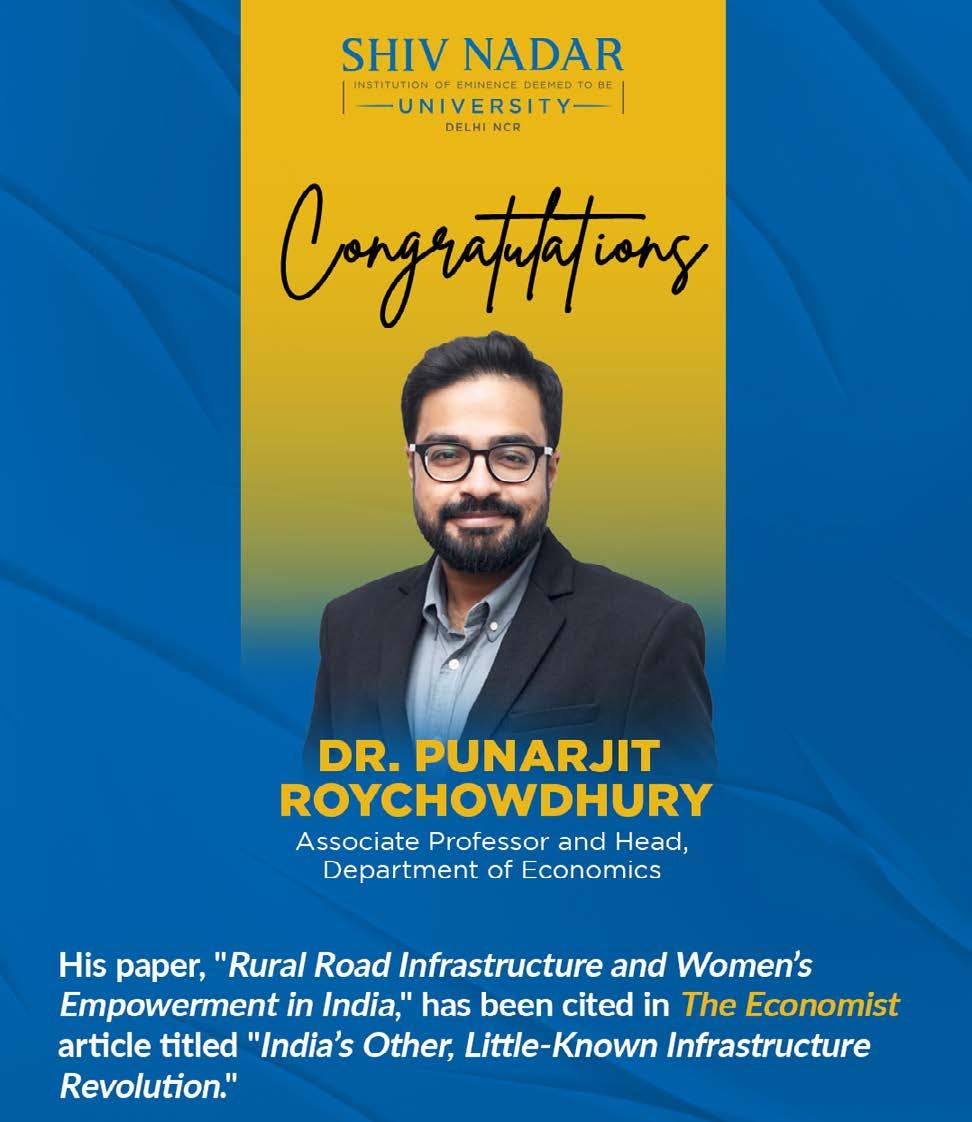
gender norms. The paper identifies the impact of the policy by exploiting the program rule that assigned roads based on the village population in a two-way
fixed effect framework. The results suggest that the policy reduces mobility restrictions faced by women and improves norms around domestic violence and intra-household agency. It also finds a positive impact of the policy on female education; however, there is limited impact on female employment. Additionally, the study documents gendered implications of the policy—men benefit more in terms of jobs than women. The paper offers essential policy prescriptions on how investment in rural roads can affect women’s lives.
Bharti Nandwani, Punarjit Roychowdhury, Rural Road Infrastructure and Women’s Empowerment in India, The World Bank Economic Review, 2024; lhae048, https://doi.org/10.1093/wber/lhae048
CONVERSATIONS ON CAMPUS
Inaugural event of Gender and STEM initiative
On the eve of the International Day for Women and Girls in Science 2024, the inaugural event for Shiv Nadar University’s Gender and STEM Initiative was held. The university recognized and acknowledged the contributions of women who have shaped the science landscape. Believing that empowering women in science is not just a necessity, it is a responsibility, Shiv Nadar University fosters an environment of inclusivity, curiosity, and creativity, and provides the generation of women scientists with the resources and opportunities they need to thrive.
The day honored those who have broken barriers, challenged the status quo, and inspired future generations of women to pursue their dreams in science. Celebrating the women who are driving scientific progress, the university and leadership continue to support their dreams through scholarships and more.






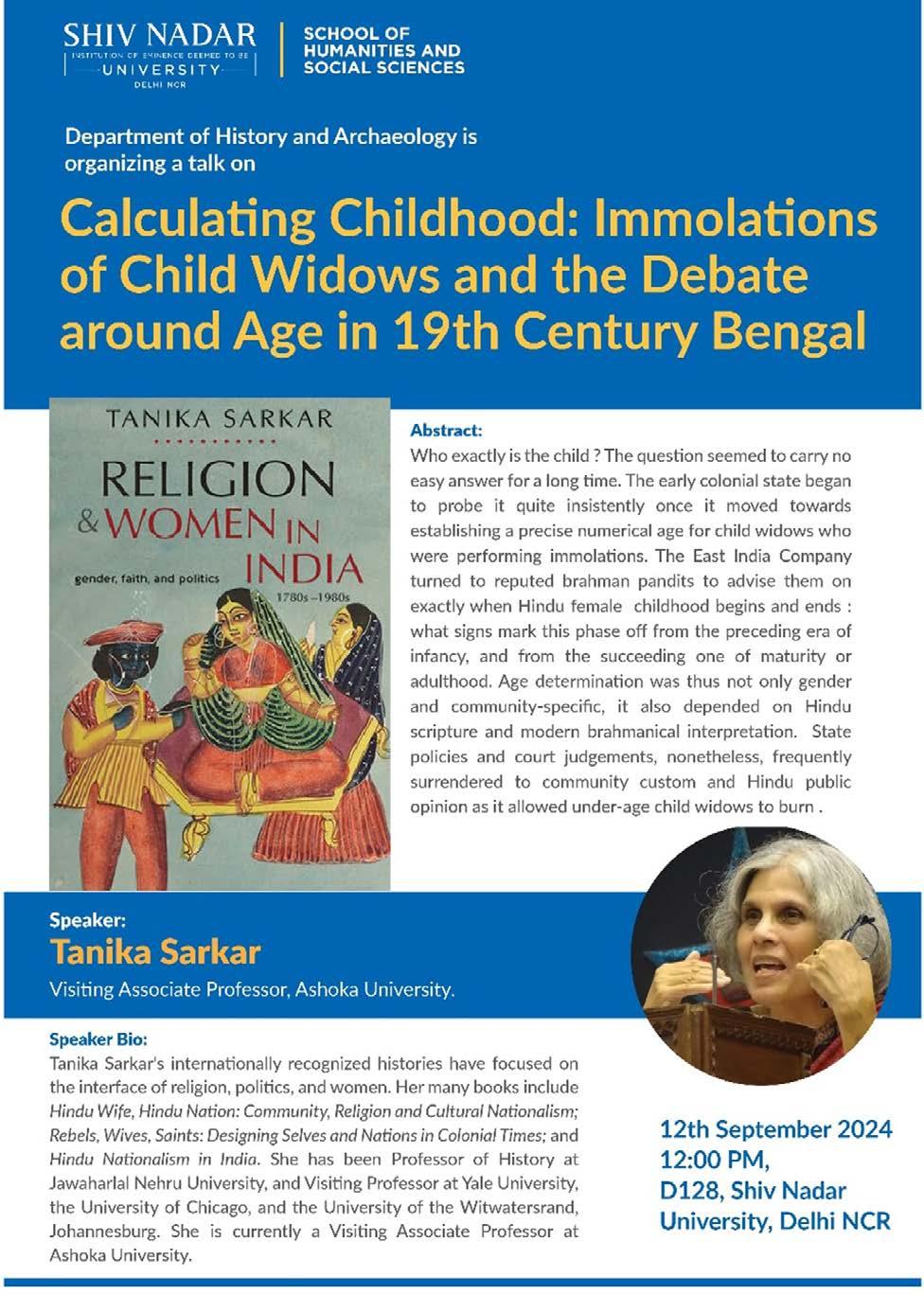

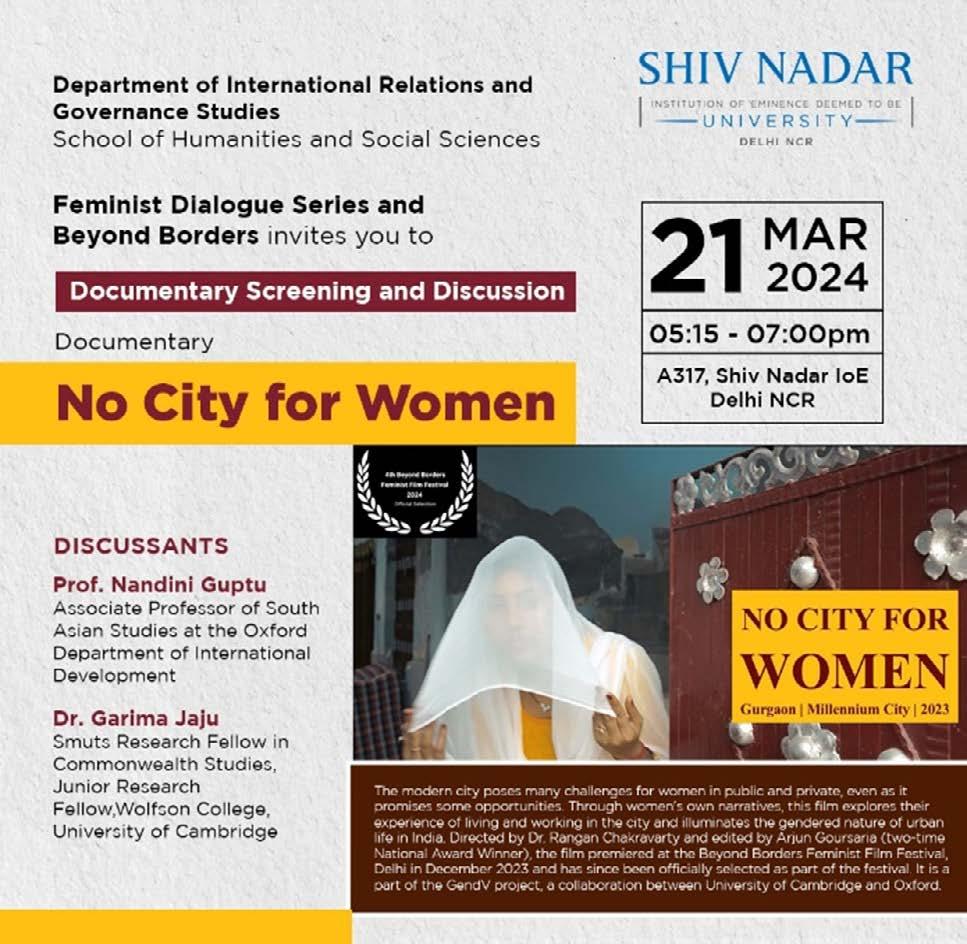
UNIVERSITY OPERATIONS
Despite making up nearly 50% of the global workforce, women represent only 28% of researchers worldwide. This gender gap in research and innovation continues to hinder progress across various fields. At Shiv Nadar University, under the leadership of Dr. Ananya Mukherjee, efforts are being made to address this disparity.
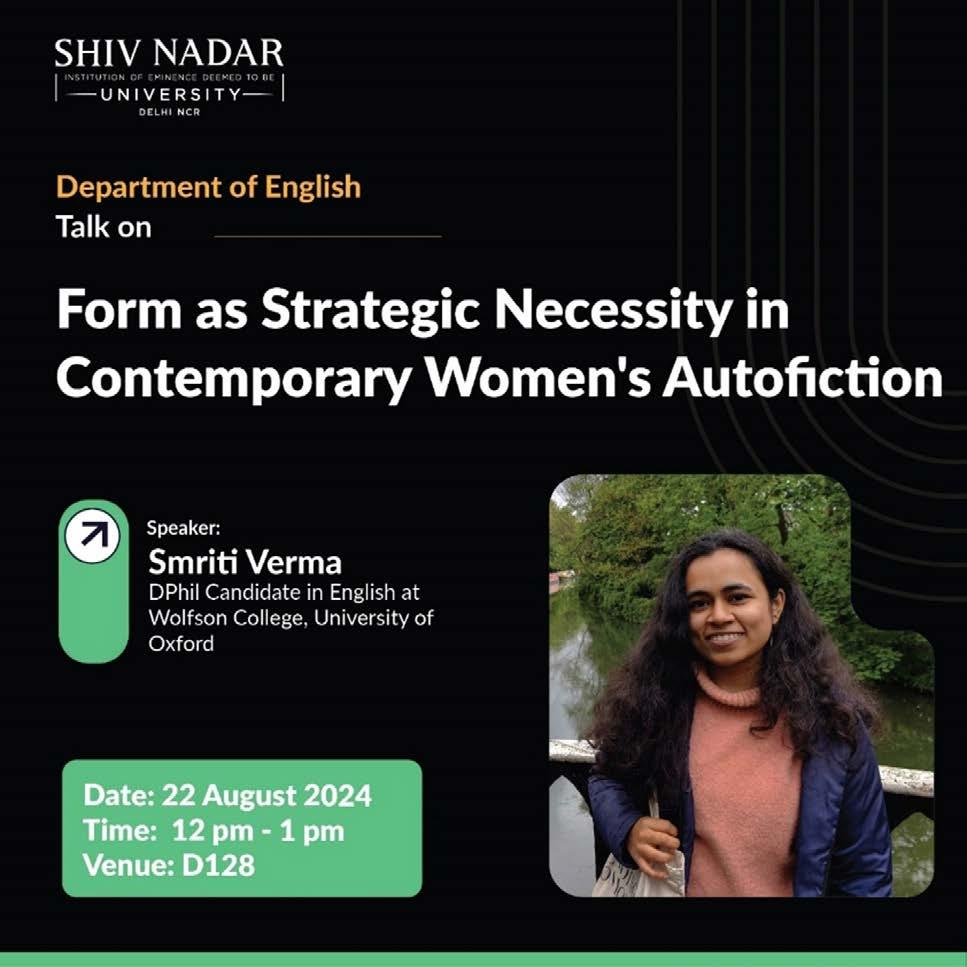
The university fosters a supportive environment for women in research, offering mentorship, resources, and opportunities for collaboration. By creating platforms that connect female researchers globally, SNU is helping to break down the barriers that limit their potential.
Women Excel on Boards (WEB)
Even a decade after the implementation of legislation that mandates at least a woman director on company boards, a huge gap remains. Developed in this context, WEB is a unique custom-curated program for women leaders and CXOs to unlock opportunities and secure a corporate board seat. It
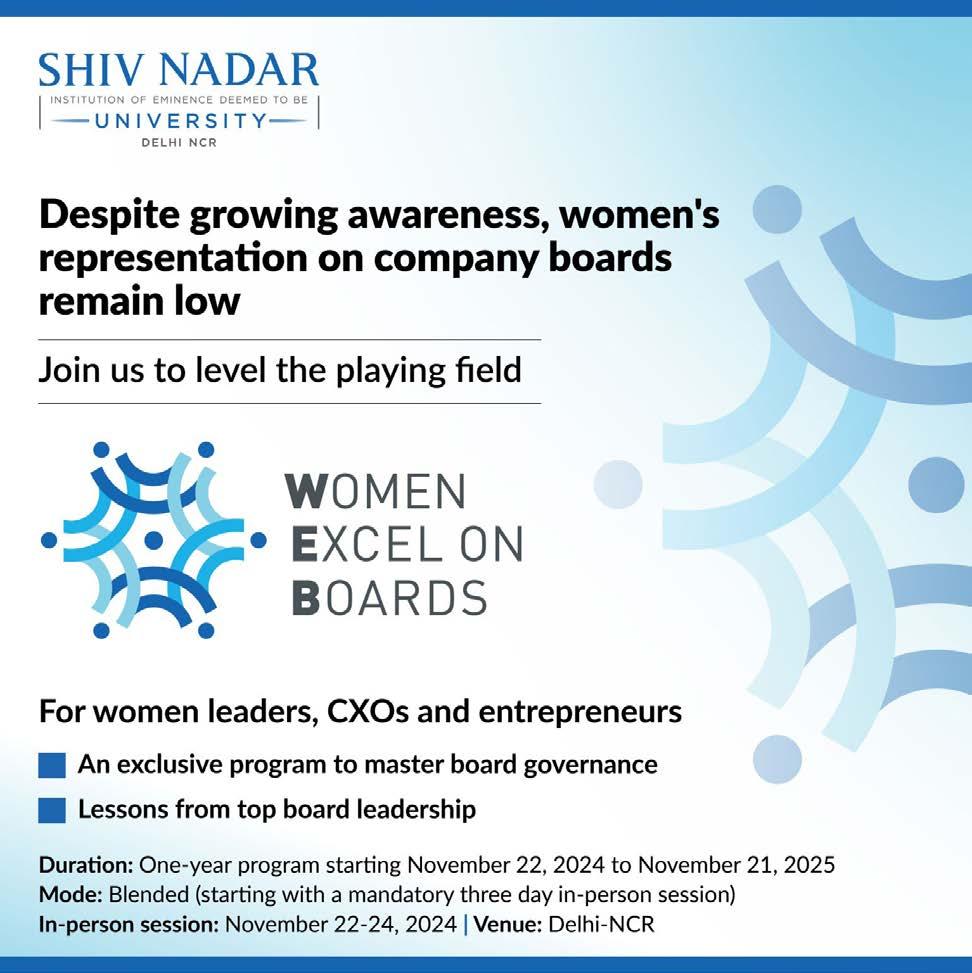

Prepares women for their first board roles or to become more effective in their current roles as board members. The program is conceptualized by a collective of industry and academia leaders committed to promoting women’s leadership.
This year, the one-year program in blended mode commenced on November 22, 2024, with a 3-day in-person session on November 22-24, 2024.
Scholarship for female B.Tech. Students launched.
Believing in the power of women, the university launched a new initiative on International Women’s Day; a scholarship awarding INR 4 lakh each for five female students enrolling in the Bachelor of Technology program offered by the university’s School of Engineering. The selected students will receive INR 1 lakh annually throughout their 4-year study.
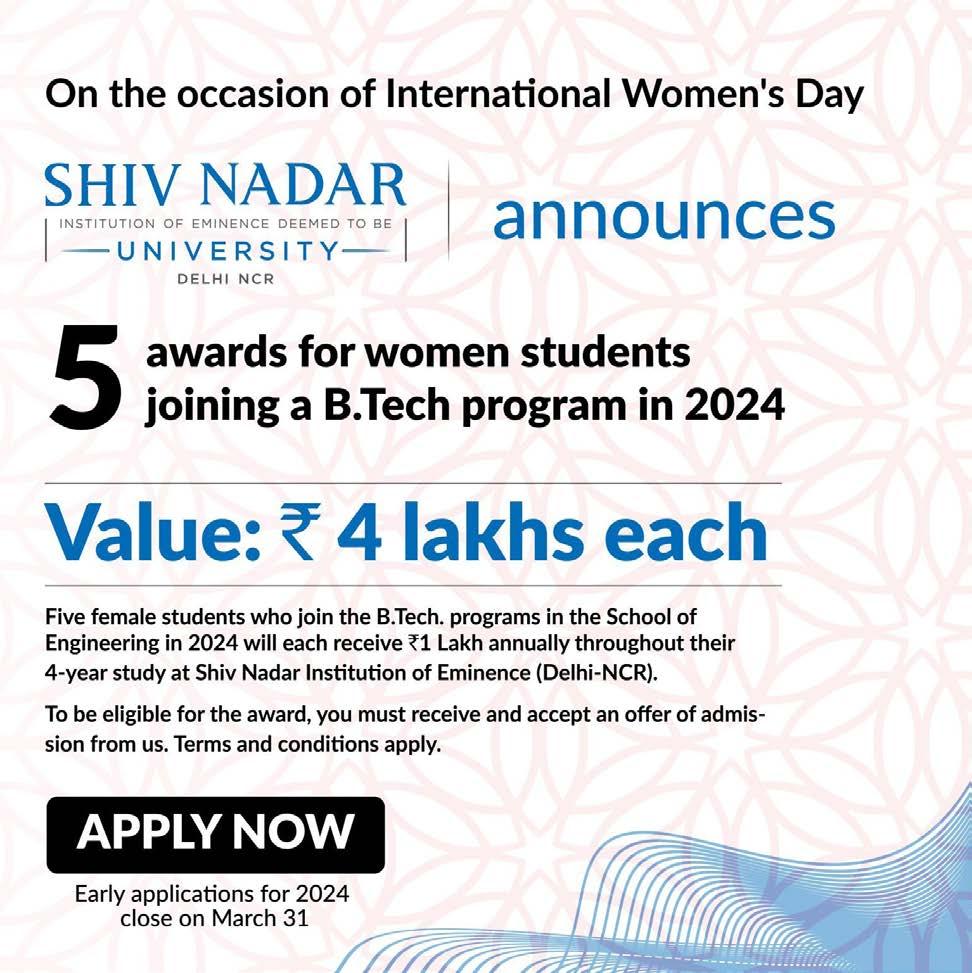
Zero tolerance policy for gender insensitivity and sexual harassment
Shiv Nadar University is an inclusive workplace with a zero-tolerance policy for gender insensitivity and sexual harassment. The University is guided by the University Grants Commission (Prevention, Prohibition, and Redressal of Sexual Harassment of Women Employees and Students in Higher Educational Institutions) Regulations, 2015, and Gender Policy and any harassment that happens within the definition of
campus and workplace is defined by the Act, under the statutory jurisdiction of the Internal Complaints Committee (ICC).
ICC submits annual compliance reports to the University Grants Commission, Labour Law authorities as per The Sexual Harassment of Women at Workplace (Prevention, Prohibition and Redressal) Act, Sub-divisional Magistrate, and is subject to internal audit. At the beginning of the annual year, the ICC also undertakes sensitization programs for all incoming students, faculty, and non-teaching staff. And has a full-time Gender Officer on campus who works closely with the ICC..

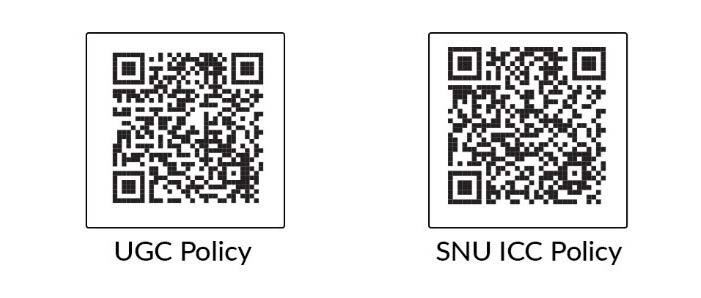
Maternity Leave
The purpose of maternity leave is to support female members of the University during pregnancy and to take care of the newborn. This leave is applicable under the provisions of the Maternity Benefit (Amendment) Act, 2017. All female members are entitled to maternity benefits of 182 days (26 weeks).
One day of Menstrual Leave
All female undergraduate students are eligible to apply for one day of menstrual leave per month. Students apply for this leave through the respective SARS (Student Attendance Recording System) portal. A maximum of one day’s leave can be availed per month, that gets auto-approved.
Girl Up Student-led club
Girl Up Shiv Nadar University is a chapter of the Girl Up Campaign, a UN Foundation Initiative. The
goal is to influence local communities, promote worldwide tolerance and respect for one another, and much more. The club has been able to make significant social contributions to the empowerment of women and children.
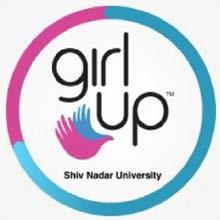

On Campus
• We provide equal opportunities to all for education and learning.
• All women students and housekeeping staff have access to free sanitary pads in the women’s toilets.
• All women’s toilets in the hostel and academic areas are equipped with hygiene bins.
• To provide quality work-life balance to our employees, the University provides a Crèche facility inside the campus to enable working parents to leave their small children under the care of trained staff so they can perform their official duties.
PARTNERSHIPS
Collaboration on researchEducation, Stigma, and Intimate Partner Violence (IPV)
Dr. Shabana Mitra, Associate Professor, Department of Economics, in partnership with Manika Bora, faculty at O.P. Jindal, and Roopal Jain at Shiv Nadar University, are working on a project around Education, Stigma, and Intimate Partner Violence (IPV). In their research, they highlight that education can influence intimate partner violence through
three channels. First, education enables women to feel more empowered to raise their voices and take decisive action against IPV, which is a deterrent to IPV. The second channel is that due to education, there is a greater realization of the stigma attached to IPV, resulting in lower reporting of IPV, even if there is no actual reduction in IPV. A third channel is education, which allows women to feel empowered and report more about IPV. Therefore, they may see that IPV increases with education. Using a novel dataset from Bihar, Jharkhand, and Uttar Pradesh, three states in Northern India, it brings forth that women completing secondary education are related to reducing reporting of intimate partner violence. At the same time, if they can make independent decisions and are employed, they report more IPV. This seemingly contradictory finding suggests that education brings more stigma to reporting, and women who are used (in the farm sector, mainly the uneducated) feel more empowered to report.
Start-ups to address sustainability
The University supports start-up ideas through the Atal Incubation Center (AIC) to encourage and create an active entrepreneurship culture. AIC is set up on a 10,000 sq. ft space at the University with the support of the Atal Innovation Mission, NITI Aayog, Government of India. The University and the Government provide 50% of the core funding to a start-up selected through a rigorous process and mentoring through university leadership and professors.
One example is Prodigious Management Consultancy Pvt Ltd. This start-up is into manufacturing antibacterial sanitary napkins for women & girls aged 15 to 49 years to manage their menstrual hygiene more effectively and efficiently, rendering a safe, infectionfree & healthy experience. Their USP is ANION chips in the napkins, which protect women from all kinds of bacterial & fungal infections leading to Cervical Cancer.
Community Initiative through the Community Connect Program
Through its Community Connect Program, Shiv Nadar University strongly focuses on community engagement in Dadri. These initiatives aim to uplift the local community through various programs, including skill development, healthcare awareness, and promoting sustainable practices. Here is a glimpse of some of our projects in this program.

Shilp Shakti
This initiative empowers women in the neighboring villages by providing them with skills in local businesses such as jewelry making, crochet, and business management.
Community Kitchens
As part of Shiv Nadar University’s Community Connect Program, in collaboration with ACCESS Development Services, women in neighboring villages are trained to operate SHG-led community kitchens, equipping them with essential entrepreneurial skills. The sessions covered savings, credit linkages, budgeting, digital payments, and online food delivery platforms, enabling participants to develop practical kitchen management budget plans. This initiative fosters self-reliance and sustainable growth by emphasizing digital and financial literacy.
Through community-driven enterprises, these women are shaping a future of economic independence and grassroots impact.
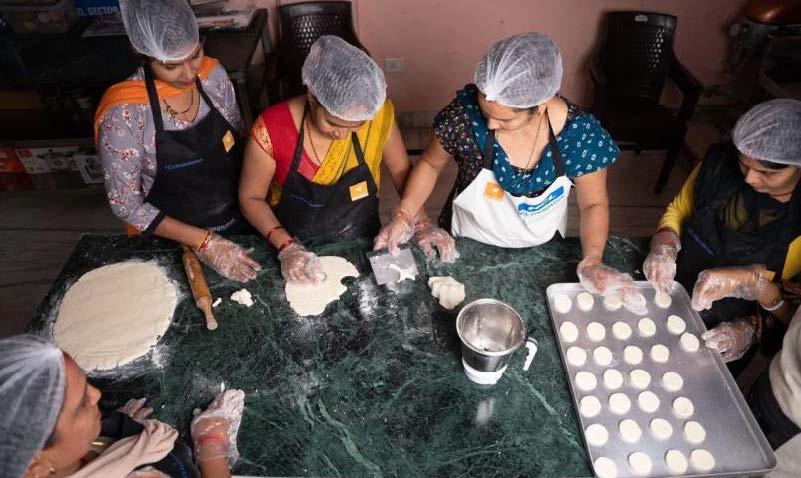
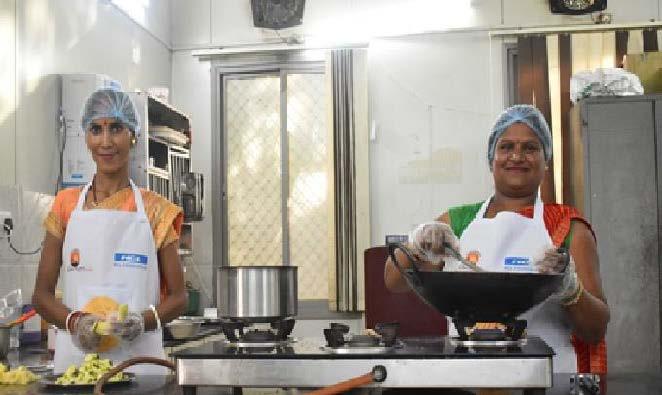
Shiv Nadar Institution of Eminence is fully committed to the UN Sustainable Development Goals (SDGs). We have embraced a four-pronged strategy for SDGs through teaching, research, our core institutional practices, and partnerships.
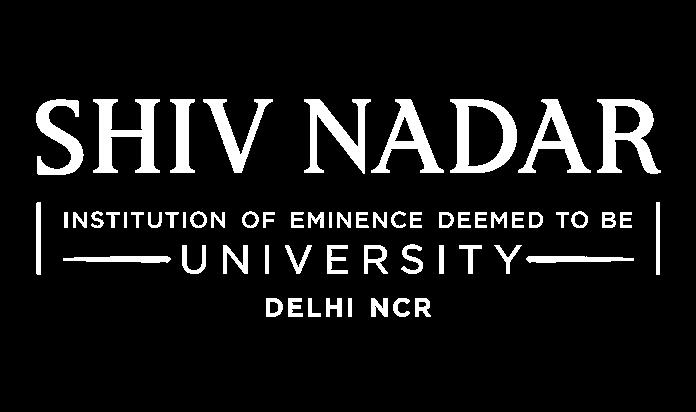
Deepa Hazrati Senior Manager, Office of the Vice-Chancellor deepa.hazrati@snu.edu.in
